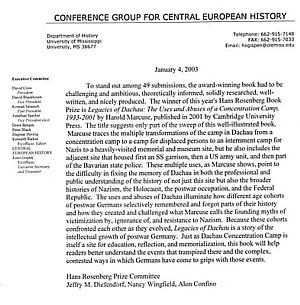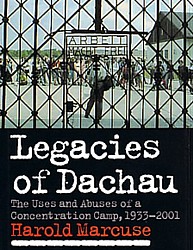 January
4, 2003 January
4, 2003
To stand out among 49 submissions, the award-winning book had to be challenging
and ambitious, theoretically informed, solidly researched, well-written,
and nicely produced. The winner of this year's Hans Rosenberg Book Prize
is Legacies of Dachau.- The Uses and Abuses of a Concentration Camp,
1933-2001 by Harold Marcuse, published in 2001 by Cambridge University
Press. The title suggests only part of the sweep of this well-illustrated
book. Marcuse traces the multiple transformations of the camp in Dachau
from a concentration camp to a camp for displaced persons to an internment
camp for Nazis to a heavily-visited memorial and museum site, but he also
includes the adjacent site that housed first an SS garrison, then a US
army unit, and then part of the Bavarian state police. These multiple
uses, as Marcuse shows, point to the difficulty in fixing the memory of
Dachau in both the professional and public understanding of the history
of not just this site but also the broader histories of Nazism, the Holocaust,
the postwar occupation, and the Federal Republic. The uses and abuses
of Dachau illuminate how different age cohorts of postwar Germans selectively
remembered and forgot parts of their history and how they created and
challenged what Marcuse calls the founding myths of victimization by,
ignorance of, and resistance to Nazism. Because these cohorts confronted
each other as they evolved, Legacies of Dachau is a story of
the intellectual growth of postwar Germany. Just as Dachau Concentration
Camp is itself a site for education, reflection, and memorialization,
this book will help readers better understand the events that transpired
there and the complex, contested ways in which Germans have come to grips
with those events.
Hans Rosenberg Prize Committee Jeffrey M. Diefendorf, Nancy Wingfield,
Alon Confino
|

